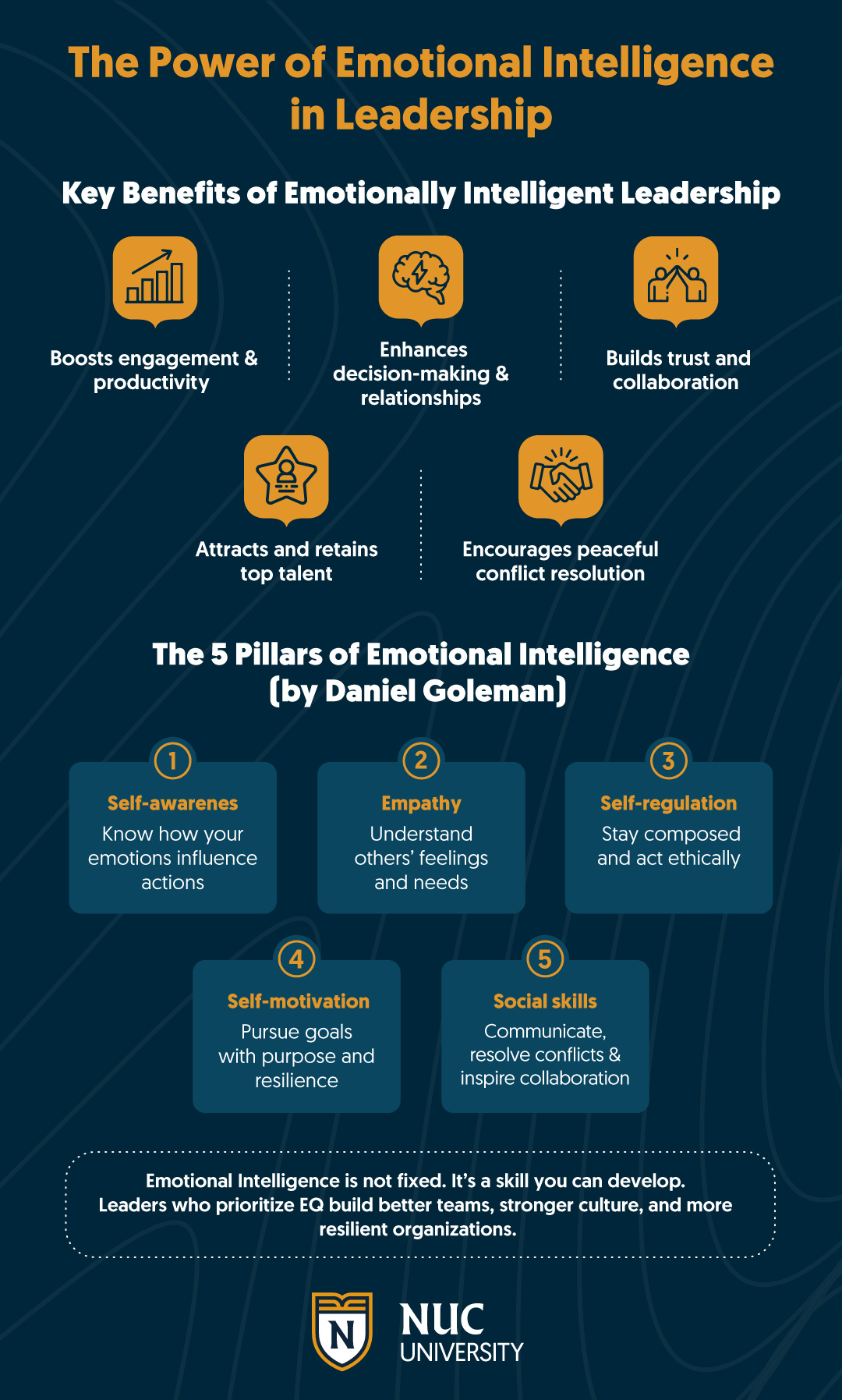Leading with emotional intelligence offers numerous advantages for teams and organizations: you will boost employee commitment, which in turn increases productivity. It also promotes peaceful problem-solving, builds a culture of trust, and strengthens your organization’s ability to attract and keep top talent.
Popularized by Daniel Goleman in the 90s, emotional intelligence is defined as the ability to recognize, understand, and manage both personal emotions and those of others, while also controlling your reactions. It involves having self-confidence, maintaining self-control, and finding personal motivation to achieve goals. These skills enable effective relationship management and the ability to inspire positive changes around us.
Emotional intelligence greatly enhances decision-making and interpersonal relationships. For this reason, it is applied across all fields, including professional settings. In fast-paced work environments, emotionally intelligent leaders can inspire their teams, effectively navigate conflicts, and foster a culture of collaboration.
While technical skills, strategic vision, and experience are essential for effective leadership, the ability to manage emotions, empathize with others, and build meaningful connections is equally important. Emotional intelligence (EQ) is, therefore, a vital factor for successful team leadership.
Why Emotional Intelligence Is Key to Leadership
Mastering your emotions, understanding their significance, and being aware of their impact on others make leadership more effective. For instance, a leader who maintains composure during stressful situations will be more respected by the team than one who reacts by shouting. According to Goleman, emotional intelligence consists of five key components that are essential for successful leadership.
- Self-awareness: Emotionally intelligent leaders understand how their emotions impact their actions and decisions. This awareness helps them remain calm in high-pressure situations and avoid impulsive responses.
- Empathy: By recognizing the emotions, needs, and viewpoints of others, leaders can establish authentic connections with their team, fostering trust and inspiring motivation.
- Self-regulation: Leaders with high emotional intelligence manage their emotions effectively, avoiding impulsive decisions, staying true to their values, and ensuring they are not influenced by stereotypes. Self-regulation focuses on maintaining control at all times.
- Self-motivation: Recognize what drives us to pursue change, maintain high standards, and view challenges or failures as valuable lessons or opportunities for growth.
- Social skills: Developing the ability to communicate effectively, address conflicts, manage change, and collaborate within a team is crucial for leading successfully.
Tips for Improving Self-awareness, Empathy, and Communication
While some individuals are naturally gifted with high emotional intelligence, these skills can also be cultivated through practice. Here are some practical tips:
- Building your self-awareness is the key starting point in developing emotional intelligence.
- Make self-reflection a habit: take time at the end of each day to assess your emotions and how they influenced your decisions.
- Ask for feedback: reach out to colleagues or mentors to get their opinions on your leadership style. Their observations can help you identify areas for improvement.
- Recognize emotional patterns: identify situations that trigger stress, frustration, or excitement. By doing so, you’ll be able to manage your emotions more effectively.
- Cultivate your empathy, as it is crucial for building strong relationships.
- Active listening: take time to listen attentively without interrupting, and express real interest in your colleagues’ perspectives.
- Try to see things from others’ perspectives: make an effort to understand their emotions and viewpoints, even if you don’t agree with them.
- Stay approachable: maintain an open and receptive attitude to ensure your team feels comfortable bringing forward ideas or issues.
- Sharpen your emotional communication skills to transform team dynamics.
- Be transparent and clear: share your emotions and expectations honestly, while maintaining respect at all times.
- Use positive language: avoid using negative or accusatory tones. Instead of saying “This is wrong,” suggest improvements like “We could enhance this by doing it this way.”
- Be mindful of your body language: make sure your gestures and facial expressions align with your message.

Sources:
Daniel Goleman’s Emotional Intelligence in Leadership: How To Improve Motivation In Your Team
https://www.tsw.co.uk/blog/leadership-and-management/daniel-goleman-emotional-intelligence/
The Importance of Emotional Intelligence in Effective Leadership
https://semaphore.io/blog/emotional-intelligence-leadership#:~:text=Emotional%20intelligence%20is%20a%20critical,teams%20to%20achieve%20their%20goals.
Why Emotional Intelligence Is Important in Leadership
https://online.hbs.edu/blog/post/emotional-intelligence-in-leadership




